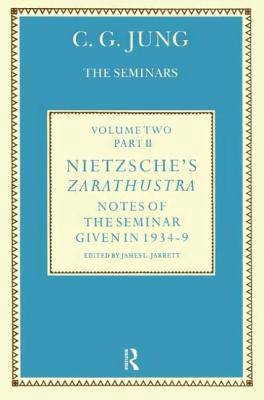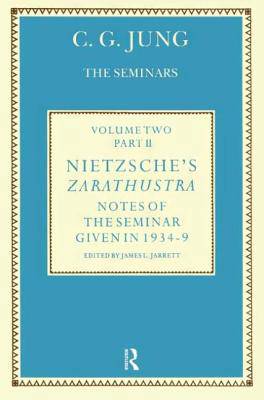
- Afhalen na 1 uur in een winkel met voorraad
- Gratis thuislevering in België vanaf € 30
- Ruim aanbod met 7 miljoen producten
- Afhalen na 1 uur in een winkel met voorraad
- Gratis thuislevering in België vanaf € 30
- Ruim aanbod met 7 miljoen producten
Zoeken
Nietzsche's Zarathustra
Notes of the Seminar Given in 1934-1939 by C.G. Jung
C G Jung
Hardcover | Engels
€ 117,95
+ 235 punten
Uitvoering
Omschrijving
First published in 1989. As a young man growing up near Basel, Jung was fascinated and disturbed by tales of Nietzsche's brilliance, eccentricity, and eventual decline into permanent psychosis. These volumes, the transcript of a previously unpublished private seminar, reveal the fruits of his initial curiosity: Nietzsche's works, which he read as a student at the University of Basel, had moved him profoundly and had a life-long influence on his thought. During the sessions the mature Jung spoke informally to members of his inner circle about a thinker whose works had not only overwhelmed him with the depth of their understanding of human nature but also provided the philosophical sources of many of his own psychological and metapsychological ideas. Above all, he demonstrated how the remarkable book Thus Spake Zarathustra illustrates both Nietzsche's genius and his neurotic and prepsychotic tendencies. Since there was at that time no thought of the seminar notes being published, Jung felt free to joke, to lash out at people and events that irritated or angered him, and to comment unreservedly on political, economic, and other public conerns of the time. This seminar and others, including the one recorded in Dream Analysis, were given in English in Zurich during the 1920s and 1930s.
Alleen bij Standaard Boekhandel
+ 235 punten op je klantenkaart van Standaard Boekhandel
Beoordelingen
We publiceren alleen reviews die voldoen aan de voorwaarden voor reviews. Bekijk onze voorwaarden voor reviews.












